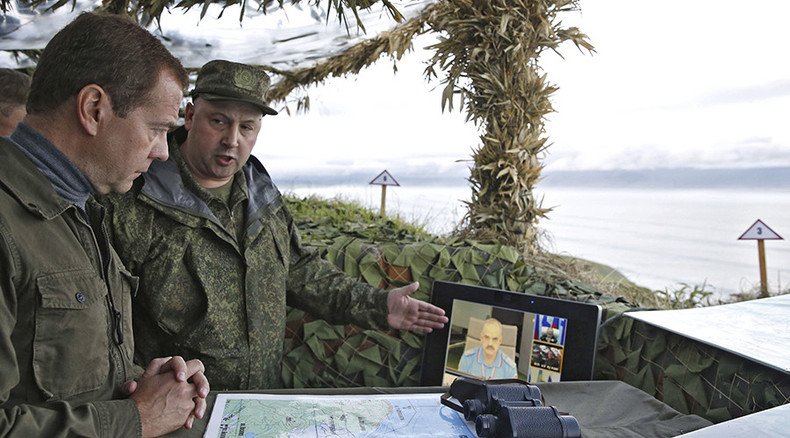Moscow officials 'have always and will continue to' visit Russian Kuril Islands - PM

The Russian Prime Minister’s visit to the Kuril Islands has provoked predictable displeasure in Japan, which continues to contest the universally recognized results of WWII. In response to Tokyo’s rebuke, Dmitry Medvedev reiterated that the strategic archipelago is an integral part of Russia.
“We want to be friends with Japan, Japan is our neighbor ... but this has nothing to do with the Kuril Islands which are part of Russia and of a Russian region called the Sakhalin region,” Dmitry Medvedev said during his visit to one of the Kuril Islands – Iturup.
“This is how it is and how it will be,” Medvedev added.
“Our [Japanese] colleagues are getting upset for nothing,” he told Russian media, adding that Russian officials “have visited, are visiting and will be visiting the Kuril Islands.”
Medvedev paid a day-long visit to Iturup during his official trip to Russia's Far East region inspecting the island’s new airport, sea port, a fish processing factory as well as attending an “Iturup youth forum” where he met with young Russian scientists and inventors.
Dmitry Medvedev called the Kuril Islands “a gate to the rapidly developing Asian-Pacific region” adding that the islands have all the resources needed for the development of industries, fishery and tourism. He also urged other Russian government officials to visit Kuril Islands more often alongside with other Russia’s remote and strategic regions such as the Far East, Kaliningrad Oblast, the Caucasus and Crimea.
‘Japan continues to contest WWII results’
Dmitry Medvedev’s working visit to the Kurils – which Tokyo keep calling its “Northern Territories” – has caused a wave of indignation among Japanese officials.
The top Russian official’s trip “contradicts Japan’s position over the Northern Territories and hurts the feelings of the Japanese people ... it is extremely regrettable,” said Hajime Hayashi, the head of the Japanese foreign ministry’s European division in a phone call to Russia’s ambassador to Japan, Evgeny Afanasiev.
It was also reported that the Japanese FM, Fumio Kishida, made a formal protest to the Russian ambassador. According to Japan’s Kyodo news agency, the country’s FM also postponed his planned visit to Russia because of Dmitry Medvedev’s trip.
READ MORE: Tokyo wants ‘new level’ in relations with Moscow – PM Abe
The Russian foreign ministry however said it had not received any official protest notes from Japan, but commented on Tokyo’s rhetoric describing it as yet another indicator of Japan’s attempt to revise the results of World War II.
“The reaction of the Japanese side… once again proves that Tokyo continues to challenge the universally recognized results of World War II,” the Russian ministry said in a statement, adding that the Japanese demarche happens to be on the eve of the 70th anniversary of the war’s end – an important date to the global community.
Japan: Putin’s visit to Tokyo may settle Kuril Islands dispute http://t.co/zIzBxqevbFpic.twitter.com/x6mYkIo8Vv
— RT (@RT_com) May 20, 2015“Such rhetoric throws discredit upon the assurances of the Japanese government that they respect the historic truth and the memory of the war that claimed lives of dozens of millions of East Asian people,” the ministry added, calling on Tokyo to focus on mending Russian-Japanese relations and developing cooperation.
As for Fumio Kishida’s visit to Russia, the Russian Foreign Ministry said that no agreement concerning the date and the terms had been reached so far, so “nothing yet could be postponed as the date of the visit was still being discussed.”
A long-lasting ‘dispute’
The sovereignty dispute over the Kuril Islands between Russia and Japan has a 70-year-long history. Russia received the Kuril Islands, which include Kunashir, Shikotan, Iturup and arches of Habomai at the very end of the World War II and insists that they became an integral part of the USSR and later Russia and therefore Russian sovereignty over this territory cannot be revised.
However, citing the loose definitions of international treaties signed at the end of the war, Tokyo demands the return of the islands despite the UN Statute maintaining that WWII outcomes, as well as the actions of the winning nations (including the US) against their enemies, are sacrosanct and inviolable.
Japan politicians admit they joined anti-Russian sanctions under US pressure - Duma speaker http://t.co/5Lu9T5XJnhpic.twitter.com/98HQXDjjLn
— RT (@RT_com) May 22, 2015Diplomatic relations remain tense as Japan refuses to sign a peace treaty with Russia, linking it to its sovereignty claims over the four South Kuril Islands. Because of Japan’s claims, the two countries have been unable to sign a peace treaty for the 70 years that have passed since the end of WWII, although they have been coexisting peacefully.
In May, Tokyo once again said it would like to settle the dispute with Russia and sign a peace treaty. Japan’s Foreign Ministry also revealed its plans to organize Russian President Vladimir Putin’s visit to Japan by the end of this year after the disruption of Putin’s previous visit to the country in 2014 on account of Japan joining in with anti-Russia sanctions.












